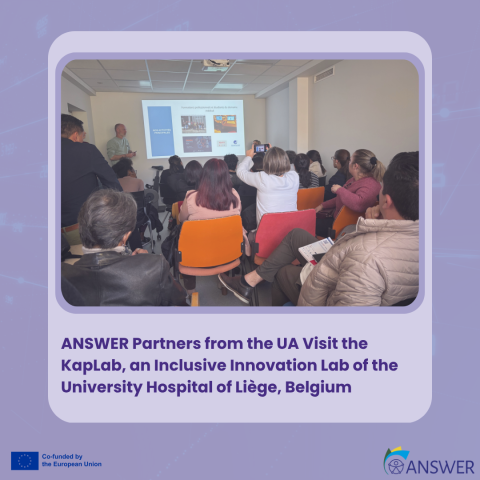
As part of a Study Visit under the Innolabs Project, ANSWER members from the University of Alicante visited KapLab, an inclusive innovation Laboratory of the University Hospital of Liège and the University of Liège, Belgium.
KapLab was born a few years ago in response to a local need: people with disabilities lacked access to an adequate and innovative rehabilitation process in the region. Thus, the lab’s main objective is to design custom technical aids, particularly through 3D printing, to deliver innovative and personalized solutions tailored to the specific needs of each individual.
InnoLabs is a project aimed at empowering universities in Ecuador and Cuba in order to become engines of entrepreneurship and innovation in STEM, so this visit served as a platform to showcase European best practices in entrepreneurship.
The visit to KapLab was of particular interest to the ANSWER project, as it represents a success story that brings together entrepreneurship and inclusion of people with disabilities. Several inspiring case studies were shared, such as:
- A custom hand prosthetic for a woman whose hand had been severely injured in a trap, enabling her to write, use gardening tools, and eat independently.
- A prosthetic device designed for a woman born without fingers, allowing her to play the violin and hold the bow.
- A tailored apparatus that enabled a young man to control the joystick of his wheelchair, giving him mobility and independence.
The work being carried out at KapLab is truly remarkable. Beyond producing life-changing prosthetics, the lab also serves as a training ground for students in the health sciences, offering practical placements for entrepreneurs who are eager to contribute in the field. Moreover, it shares its expertise internationally as a member of a European innovation network, contributing to broader knowledge exchange and capacity- building in assistive rehabilitation technologies.
In conclusion, the visit to the KapLab highlighted the transformative power of innovation when it is guided by empathy, collaboration and a commitment to social inclusion. It stands as a model for how academic institutions, healthcare providers and entrepreneurial initiatives can work together to create tangible solutions that improve lives.





